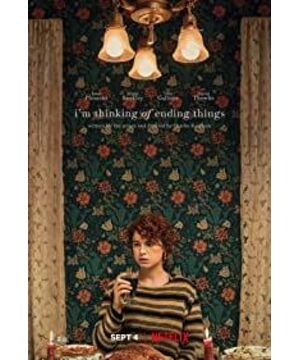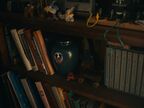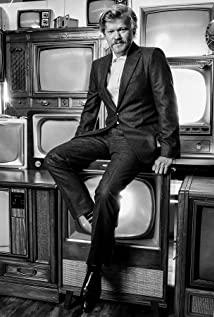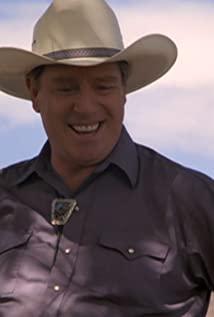I want to end this. "who am I?
After watching the movie, it is not difficult to see that "I" is Lucy, Jake, and the lonely old man - the school cleaner, and more importantly, each of us.
In fact, there has never been a girlfriend to be brought home by Jake, and there is no specific experience of meeting his parents. The entire movie is a frustrated, inferior, sensitive and lonely old man's ultimate fantasy in his later years - mixed with Fantasies in miniature memories of failure, pain, fear, etc. This fantasy is not based on one specific experience, but condenses the old man's many frustrated experiences of rejection, rejection and denial in his life.
In fact, the film has revealed a lot of clues from the beginning.
1. Two-line narrative
The film deals with the story from the beginning with a two-line narrative: one line is Jake and Lucy; the other is the strange old man who works at the school. These two lines unfold at the same time, and I can't help but think of the connection between the two groups of characters. I thought at first that the old man would be Jake's father or something. But the further back in the movie, the more you can find the connection between Jake and the old man.
2. The "heart-to-heart" of the male and female protagonists
The first time is not long in the beginning, Jake and Lucy show their extraordinary tacit understanding. When the heroine flashed "I want to end all this" in her mind for the first time, the hero seemed to be able to hear her inner voice and asked her what she was talking about, but in fact the heroine didn't say anything at all.
The second time was when a poem flashed in the female lead's mind, and the male lead instantly mentioned the poet who wrote the poem.
The third time is when the male protagonist asked the female protagonist if he listened to music. Here is a detail. The male protagonist covered his mouth. In fact, he did not make a sound, but the female protagonist heard the question he was about to ask and replied. good. It seems that the male protagonist himself has discovered that he and the female protagonist have some kind of commonality, and can know each other's thoughts flashing in the other's heart.
The "heartedness" here is actually paving the way for the male and female protagonists to be the same person (Lucy is a character imagined by Jake).
3. Doubts about the heroine's name and occupation
First of all, what is the name of the heroine? Lucy? Louisa? Lucia?
In the car at the beginning, the hostess kept receiving missed calls with the same name as herself. How can people get their own phone calls? There are only two possibilities. The first is that this person is an impostor, a fake Lucy. Second, the character itself does not exist and therefore does not require rationality.
Lucy suddenly becomes Louisa when Jake introduces his girlfriend to his parents. At the dinner table, the hostess's phone rang again, and this time both Lucy and Louisa appeared on the missed caller ID. With the encouragement of Jake's parents, when she finally answered the phone, the other party was an old male voice, constantly repeating some specious sentences.
At this time, the story of the old cleaner was interspersed. The old man witnessed the process of a waitress named Yi Fang being shown his love, and then the hostess received a call showing Yi Fang. If it is said that she was the one who called just now, can it be understood that Yi Fang is also the shadow of the heroine?
Later, the heroine's name became Lucia, and her clothing and accessories were constantly changing.
Now, let's talk about the heroine's profession. In the car, we knew she was going to write a paper, seemingly related to biology, and guessed she was a science student. But when the male protagonist introduced her, she was a painter by profession. It can barely be understood that her major and occupation are different. but. Then, after the transition, the male protagonist suddenly said that the female protagonist was a waitress, and the two of them met in a restaurant and fell in love. Does this make no sense?
All this shows that the heroine is the epitome of a fantasy that does not exist. Different names and occupations reveal that this character is a condensed body that combines countless failed emotional experiences of the male protagonist. He may have had several similar short-term relationship experiences, but each ended in failure.
4. Parents who walk in the tunnel of time
In the process of going home to see his parents, many problems were also exposed. For example, parents who don’t go in first when they arrive at the door, don’t go downstairs, the weird atmosphere (the male protagonist shakes hands with his father stiffly, resisting his mother to touch him)… and the most magical and surreal part: the age of the parents keeps changing, at the beginning She was in a healthy state, and then she suddenly turned white, and her mother suddenly turned into a youthful state. In the blink of an eye, she became old and terminally ill. It is also revealing that what is happening is not one event, but a vicious cycle that repeats at different times.
Frustrating the character of inferiority - do not believe that someone really loves you - thinks that all the people who fall in love with him are reluctant (maybe the male protagonist has no love experience at all, from the ice cream shop afraid of being laughed at by the female cashier and dare not appear at the counter Judging from the previous example, he has an almost exaggerated fear of the opposite sex, and even in the realm of fantasy, he cannot imagine that someone will really love him because of his inferiority) - thinks that his parents are also minus points - see the end After his parents, his girlfriend was even more determined to leave him - deepening his frustration.
"Bring your girlfriend home" is actually a symbolic metaphor, because every time it exposes his fears - the other party wants to leave him, wants to end it as soon as possible, hates him (including his family of origin), and The only thing he can do is desperately stall for time and try to please the other party, but it often backfires. The relationship with his parents also revealed his childhood experience, ordinary, not smart, no talent, but very hard-like every ordinary person.
5. Who is "I"?
In the second half, I once thought Lucy was a girl who lost her memory, and her family was trying to help her regain her memory. But it soon became clear that the female protagonist was not only the girlfriend imagined by the male protagonist, but also a part of himself.
While in the car, the hostess recited a poem she wrote: Bone Dog. This poem reveals the male protagonist's heart to a large extent, and his immediate reaction is also: this poem is like writing me. The hostess smiled: Isn't writing poetry just wanting such an effect? It has universality, so that people who read it can empathize with it. When the female protagonist walked into the male protagonist's childhood room and found the song "Bone Dog", she was shocked. Because she is actually Jake.
On the way back, he proposed to go back to the middle school and specified exactly how many classrooms there were. This was not something that ordinary students would notice, but a detail that the cleaners would pay attention to. And the old cleaning man being mocked by the students is exactly the same as Jake's always being mocked by the female ice cream shop assistants.
It is not difficult to find out that Jake is the old cleaner. He is lonely, inferior, and full of frustration. He just lived his mediocre life like this. He has no glory and no happiness. He can only achieve the climax of his life in fantasy.
But is he really worthless? Not so, he is proficient in poetry, art, loves philosophy and painting, and his inner world is full and rich. However, this does not conflict with his external appearance (fat, introverted, introverted, insensitive, inferior and sensitive). At the same time, the male protagonist is also indecisive and not good at rejecting. He clearly wants to end everything, but he always keeps his thoughts in his heart and makes actions and behaviors against his will. He reminds me of a man, also the hero of Charlie Kaufman's film, the hero in Synonyms of New York, a Loser through and through. I began to suspect that this man was essentially Charlie Kaufman himself, each of us.
The overall style of the movie is very restrained. The first 30 minutes are in the car, and most of the scenes after that are at home. For a movie, limited space is a test of the dramatic tension of the lines. In the seemingly dull and boring car and indoor space, the conversation between the male and female protagonists is not simple. My favorite part is that the director is very good at using metaphors. To give a few examples.
1. The two people in the car talked about the train. The male protagonist said that it would be dangerous to stop the moving train. And this sentence also hints at the current situation of the two of them - driving to the car of the male owner's house, indicating that although the female owner regrets and wants to stop all this, now the two have no way back. (Is it the same in life?
2. Talking about bugs, talking about not everything wants to survive, maybe the life of bugs is set from the beginning. (What about humans?
3. Discuss the fate of sheep and pigs on the farm, "farm life is cruel", "everything is mortal", and frozen sheep. (People who die of old age? Indicate the fate of mankind?)
"People tend to believe that hope is always there, that there is an afterlife after death. This is a fantasy unique to human beings. It is a fantasy that things will always change. Maybe it's because only human beings understand that things are not going to change. True or false There is no way to say, but I suspect that only humans know that their own death is inevitable, other animals live in the present, humans can't, so humans create hope."
4. The relationship between the male and female protagonists is also the epitome of the love of many people. Obviously not suitable, but it has been delayed because of sunk costs. "What's the point of going on like this, I know the direction of this relationship, he's a good man, but... if this goes on, there will be no results, I already know it. Maybe it's human beings to keep going even though I know there is no way to go. Nature. The other way takes too much energy and determination. People stay in inappropriate relationships because it's easier."
"I want to end this."
But I just thought, I can't do it. Because I don't know how to say no. Because we were born as human beings, we don't speak sincere words.
Therefore, "sometimes thoughts are closer to the truth and closer to reality than actions."
Just as humans know that things don't always get better, they concoct the word "hope" to comfort themselves.
I want to end this.
View more about I'm Thinking of Ending Things reviews











